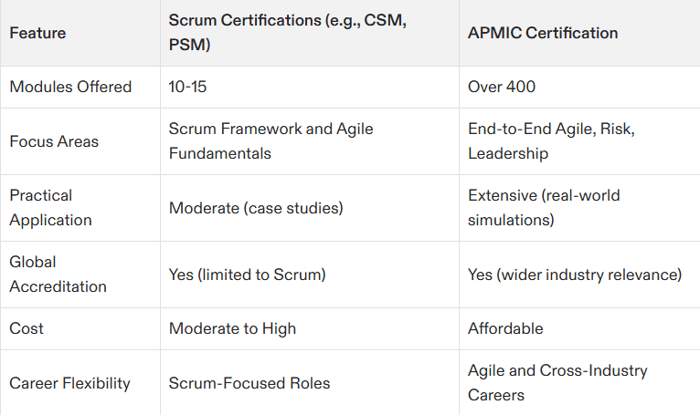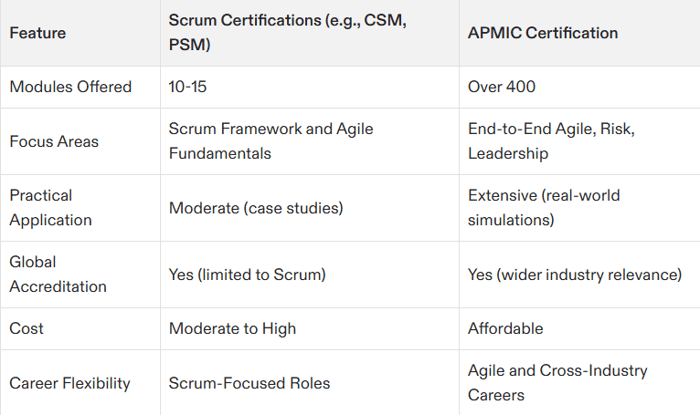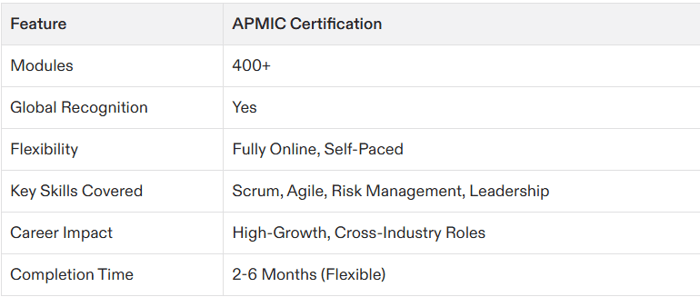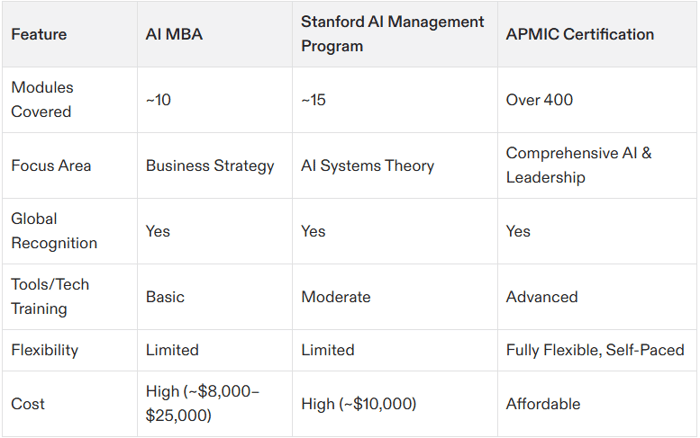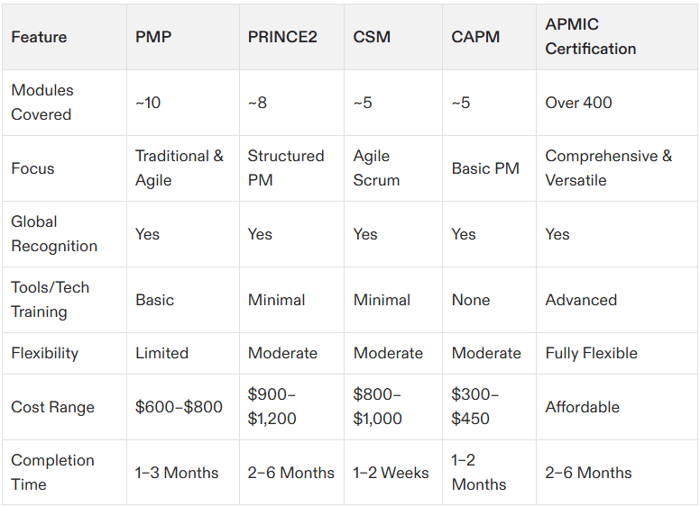Table of Contents
- What Is a Scrum Project Management Certification?
- Why Get a Scrum Project Management Certification?
- Key Features of Scrum Project Management Certification
- Top Scrum Certifications Compared to APMIC
- FAQs on Scrum Project Management Certification
- Q1. Which Scrum Certification Is the Best?
- Q2. How Long Does a Scrum Certification Take?
- Q3. Are Scrum Certifications Online?
- Q4. What Roles Can I Get with a Scrum Project Management Certification?
- Q5. Why Choose APMIC Certification Over Scrum-Specific Programs?
- Q6. How Much Does a Scrum Certification Cost, and How Does It Compare to APMIC Certification?
- Q7. How Do I Choose the Right Certification Based on My Career Goals and Industry Needs?
- APMIC Certification Advantage
- Final Thoughts
What Is a Scrum Project Management Certification?
A Scrum project management certification is a specialized training program focusing on the Agile framework known as Scrum. It equips professionals with the knowledge and tools to manage projects effectively in fast-paced, iterative environments. Scrum is widely used in industries such as IT, marketing, and product development, where adaptability and collaboration are essential.
The certification’s primary focus is on understanding Scrum roles (Scrum Master, Product Owner, Development Team), ceremonies (sprint planning, daily stand-ups, retrospectives), and artifacts (product backlog, sprint backlog). By earning this credential, you demonstrate mastery of leading Agile projects and fostering team efficiency.
While Scrum certifications are highly sought after, programs like APMIC certification expand on Agile principles, providing a well-rounded curriculum encompassing over 400 modules. A certification like APMIC not only includes Scrum but also teaches complementary approaches like Kanban, Lean, and risk management strategies that make professionals agile in any industry.
If you’re considering advancing your career, earning a Scrum project management certification could be pivotal.
Why Get a Scrum Project Management Certification?
Earning a Scrum project management certification gives you the tools not only to keep pace with the Agile trend but also to lead it. Here are compelling reasons to obtain this credential and how it can transform your career trajectory.
1. Master Agile Frameworks
Scrum is the backbone of Agile methodology, helping organizations build high-performing teams to deliver projects swiftly and efficiently. Understanding the nuances of Scrum enables you to excel in roles where speed and adaptability matter most.
2. Enhanced Career Opportunities
Professionals with Scrum certifications are in high demand. Roles like Scrum Master, Agile Coach, and Product Owner often require or prefer candidates with formal training. The certification showcases your dedication to mastery and positions you for higher-paying jobs.
3. Skills That Go Beyond Scrum
Programs like APMIC certification take the Agile approach further by including skills in leadership, critical thinking, and stakeholder management—making you more versatile and employable in a variety of roles.
4. Boosted Earning Potential
Certified Scrum professionals often see a 20% increase in salary compared to their uncertified peers. With greater credibility, you’ll find yourself eligible for senior roles and consulting opportunities.
5. Team Empowerment Skills
Learning how to guide Scrum teams provides you with the ability to inspire aligned goals among cross-functional units. You can foster a collaborative spirit that delivers exceptional project results.
Scrum is indispensable in industries undergoing rapid change, such as IT and fintech, but global certifications like APMIC offer an edge with cross-industrial applications.
Key Features of Scrum Project Management Certification
Before enrolling, it’s critical to understand the curriculum and benefits offered by a Scrum project management certification. Here’s what you can expect.
Core Topics Covered
Scrum Roles and Responsibilities
Deep dives into the roles of Scrum Master, Product Owner, and Development Team. You’ll understand how each collaborates to drive forward sprints.Sprint Planning and Execution
Learn the art of turning a product backlog into actionable tasks that teams can accomplish within time-boxed sprints.Agile Terminology
Understand key Scrum terms such as velocity, burndown charts, and prioritization techniques that are vital to Agile project success.Retrospectives and Continuous Improvement
Master the art of analyzing team performance and iterating your approach to improve future sprints.
Practical Applications
Most Scrum certifications, including alternatives such as APMIC certification, blend theory with application. Expect to manage simulated projects using Scrum principles, ensuring you’re job-ready upon certification completion.
Global Recognition
Certifications like Certified ScrumMaster® (CSM) or Professional Scrum Master™ (PSM) are internationally recognized, making them indispensable for global professionals—a feature that APMIC also matches or even exceeds with its international accreditation.
Top Scrum Certifications Compared to APMIC
When choosing a Scrum project management certification, it’s essential to weigh program features, costs, and flexibility. Below is a comparison of standard certifications versus APMIC.
Programs like APMIC certification expand learning beyond just Scrum, preparing you for high-growth roles in multiple industries.
FAQs on Scrum Project Management Certification
Q1. Which Scrum Certification Is the Best?
The best certification depends on your goals. CSM (Certified ScrumMaster®) is great for beginners, while PSM (Professional Scrum Master™) suits those seeking a deeper understanding. However, if you want a broader, more versatile credential, APMIC certification is ideal as it combines Scrum with other methodologies and leadership training.
Q2. How Long Does a Scrum Certification Take?
Most Scrum certifications can be completed in 2-5 days via intensive workshops. APMIC certification, by contrast, offers a flexible pathway, allowing you to complete its 400+ modules at your own pace within 2-6 months.
Q3. Are Scrum Certifications Online?
Yes, many Scrum certifications—including CSM and APMIC certification—are available online. APMIC also provides interactive tools like simulations, giving you practical exposure even if you’re studying remotely.
Q4. What Roles Can I Get with a Scrum Project Management Certification?
Common roles include Scrum Master, Agile Project Manager, Product Owner, and Delivery Lead. Advanced certifications like APMIC certification expand career options to include Risk Manager, Senior Project Consultant, and Portfolio Manager.
Q5. Why Choose APMIC Certification Over Scrum-Specific Programs?
APMIC certification provides broader industry applicability. While Scrum certifications focus on one methodology, APMIC includes Agile, Lean, Kanban, and leadership modules. Plus, its global recognition ensures more career opportunities.
Q6. How Much Does a Scrum Certification Cost, and How Does It Compare to APMIC Certification?
The cost of Scrum certifications varies. For example, CSM (Certified ScrumMaster®) costs between $500 and $1,500, depending on the provider and location. Other certifications like PSM (Professional Scrum Master™) are more affordable, starting at around $150-$500.
In comparison, APMIC certification is often more cost-effective, offering a vast curriculum of over 400 modules at a lower price point. Additionally, APMIC provides greater flexibility, allowing learners to customize coursework to their needs, which adds significant value for those looking to gain a comprehensive skill set.
Practical advice for budgeting professionals: Assess the long-term benefits versus upfront costs. APMIC’s affordability and wide-ranging curriculum make it a worthwhile investment for career-focused individuals.
Q7. How Do I Choose the Right Certification Based on My Career Goals and Industry Needs?
Choosing the right certification begins with understanding your career objectives and the specific demands of your industry.
For Entry-Level Professionals: If you’re starting out in Agile or project management roles, certification like CSM (Certified ScrumMaster®) provides a solid foundation in Scrum basics. But if your goal is to gain a broader perspective across different frameworks, APMIC certification delivers unmatched training.
For Industry-Specific Roles: Consider the certifications recognized within your field. For example, IT professionals benefit significantly from Scrum-specific programs. However, multidisciplinary certifications like APMIC cater to industries ranging from healthcare to finance and beyond.
For Leadership Aspirations: If you aim to move into leadership or strategic project management positions, APMIC uniquely complements Scrum knowledge with risk management, stakeholder communication, and team leadership training.
Practical advice for aspirants exploring their options: Choose a certification aligned with not just your current role but also your 5-10 year career plan. Programs like APMIC provide the flexibility and breadth of knowledge required for multi-level growth and cross-industry adaptability.
With these additions, you now have an expanded understanding of the Scrum project management certification landscape and the many ways it can align with your career trajectory. This includes comparisons with APMIC certification, offering a broader perspective to help you make an informed decision.
APMIC Certification Advantage
The APMIC certification offers an unmatched range of features that make it a compelling option for professionals seeking to excel in project management.
Click here to explore APMIC and transform your career.
Final Thoughts
A Scrum project management certification is your gateway to mastering Agile practices and boosting your career in industries where innovation and adaptability reign supreme. While certifications like CSM or PSM are excellent, they focus exclusively on Scrum principles.
For a well-rounded approach to project management, APMIC certification offers unparalleled breadth and flexibility. With over 400 modules, global recognition, and practical applications, it equips you for roles that go beyond Scrum-specific careers.
Take charge of your future. Explore APMIC certification and become a globally recognized project management expert!

